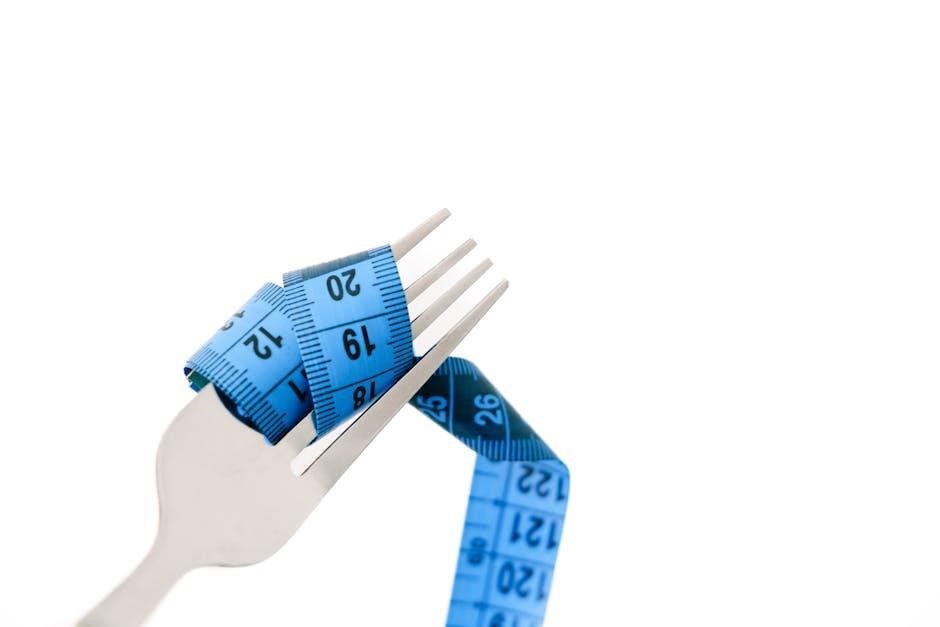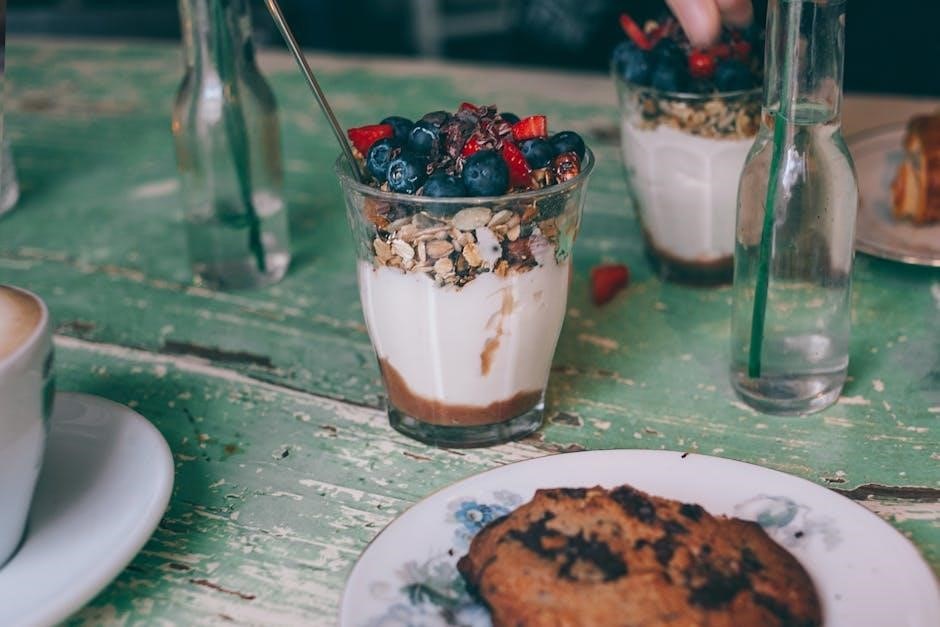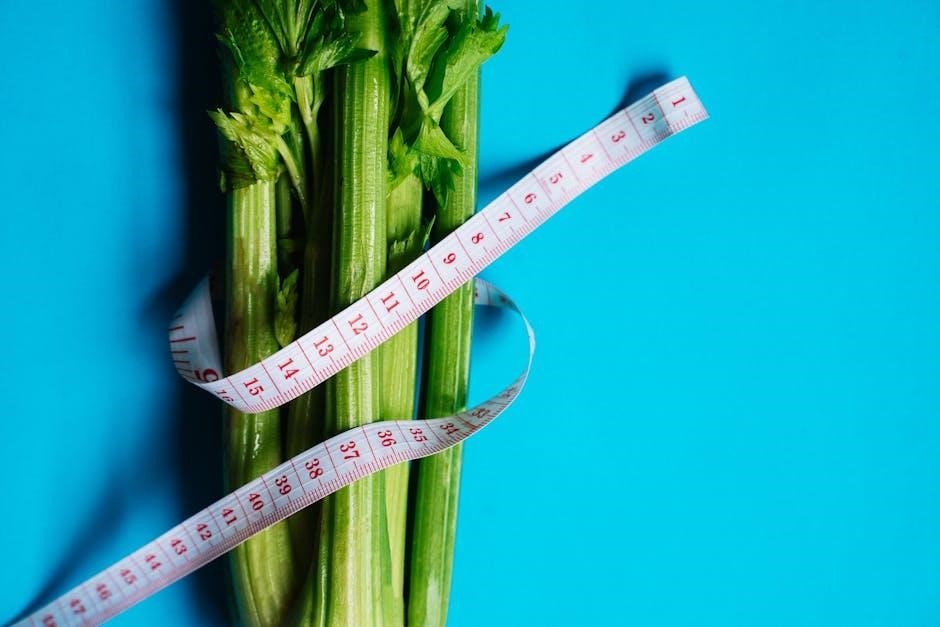
The 800-Calorie HCG Diet Plan is an updated version of the traditional 500-calorie protocol, offering a more flexible approach to weight loss while maintaining HCG injections.
Designed for sustainability, this plan allows for a higher calorie intake, focusing on protein-rich foods and healthy meal options to reduce hunger and support long-term success.
It combines the benefits of HCG with a balanced diet, making it easier to adhere to while promoting significant weight loss and improved overall health.
Consult a healthcare provider before starting, as this plan is tailored for specific needs and requires careful monitoring for safety and effectiveness.
Overview of the 800-Calorie HCG Diet
The 800-Calorie HCG Diet is a modern adaptation of the traditional 500-calorie HCG protocol, designed to promote sustainable weight loss while reducing hunger and fatigue.
It combines daily HCG injections with a slightly higher calorie intake, focusing on protein-rich foods, vegetables, and healthy fats to maintain muscle mass and energy levels.
This plan is classified as a Very Low-Calorie Diet (VLCD) but offers more flexibility, making it easier to follow for individuals with busy lifestyles or higher caloric needs.

The diet aims to reset metabolism, suppress appetite, and target stored fat for energy, leading to rapid weight loss while minimizing muscle loss.
However, it is not suitable for everyone and should only be undertaken under medical supervision to ensure safety and effectiveness.
How the 800-Calorie Plan Differs from the Traditional 500-Calorie HCG Diet
The 800-Calorie HCG Diet differs significantly from the traditional 500-calorie version by allowing a higher daily caloric intake, which reduces hunger and fatigue.
While the 500-calorie plan strictly limits food portions, the 800-calorie version offers more flexibility, including additional snack options and a broader range of protein sources.
This adjustment makes the diet more sustainable for individuals with higher energy needs or those who find the 500-calorie restriction too challenging.
Both plans use HCG injections to target stored fat, but the 800-calorie approach is designed to improve adherence and minimize potential side effects like extreme hunger or irritability.
However, the core principle of using HCG to suppress appetite and accelerate fat loss remains consistent in both versions.

Phases of the 800-Calorie HCG Diet
The 800-Calorie HCG Diet is structured into phases, starting with HCG injections and a calorie-restricted diet, followed by a transition to higher calories and long-term maintenance.
Phase 2: HCG Injections and 800-Calorie Diet
Phase 2 of the 800-Calorie HCG Diet combines daily HCG injections with a carefully structured 800-calorie meal plan, designed to promote rapid weight loss while preserving muscle mass.
During this phase, participants follow a strict diet focusing on lean proteins, vegetables, and limited portions of low-calorie foods to maximize fat burning and minimize hunger.
HCG injections are typically administered for 23 to 40 days, depending on the program, and are believed to enhance fat loss by targeting stored fat reserves.
Adherence to the meal plan is crucial, as deviations can impact results. This phase is medically supervised to ensure safety and effectiveness, making it essential to follow guidelines closely.
Phase 3: Transitioning Off HCG with a 1200-Calorie Diet
Phase 3 marks the transition off HCG injections, where participants gradually increase their calorie intake to 1200 calories daily, focusing on low-carb, high-protein meals to stabilize weight loss.
This phase typically lasts 3 weeks and involves eliminating HCG while introducing a wider variety of foods to prevent weight regain and support metabolic balance.
Meal planning is crucial, with an emphasis on lean proteins, vegetables, and healthy fats to maintain satiety and overall health.
Consulting a healthcare provider is recommended to ensure a smooth transition and address any challenges that may arise during this adjustment period.
This phase is designed to help individuals adapt to a sustainable eating pattern, laying the foundation for long-term weight management and improved dietary habits.
Phase 4: Long-Term Weight Management
Phase 4 focuses on maintaining weight loss achieved through the 800-calorie HCG diet, emphasizing sustainable lifestyle changes rather than restrictive dieting.
Participants are encouraged to adopt balanced eating habits, incorporating a variety of nutrient-dense foods, including whole grains, fruits, vegetables, lean proteins, and healthy fats.
Regular physical activity and mindful eating are key components, helping individuals maintain their weight and improve overall health.
Periodic monitoring and adjustments to the diet are recommended to ensure continued success and prevent weight regain.
This phase is about creating a lasting, healthy relationship with food and exercise, ensuring the results of the HCG diet are maintained long-term.

Food List and Meal Planning
The 800-calorie HCG diet includes lean proteins, vegetables, and limited carbs, with meal plans emphasizing nutrient-dense foods to promote satiety and support weight loss effectively.
Approved Foods for the 800-Calorie HCG Diet
The 800-calorie HCG diet focuses on lean proteins, fresh vegetables, and limited whole carbs to maximize weight loss while minimizing hunger. Approved foods include:
- Lean meats like chicken, turkey, and lean beef (portion-controlled)
- Fatty fish such as salmon and mackerel in moderation
- Vegetables like spinach, broccoli, and leafy greens
- Low-carb fruits like strawberries, blueberries, and apples
- Small portions of complex carbs like cauliflower rice or quinoa
- Healthy fats such as avocado and olive oil in limited amounts
Portion control is crucial, and processed foods are strictly avoided to ensure optimal results and adherence to the diet’s guidelines.
Snack Options and Meal Ideas
The 800-calorie HCG diet offers a variety of snack and meal options to keep you satisfied while adhering to the calorie restrictions. Snack options include:
- Fresh vegetables like cucumber, celery, or bell peppers paired with lean proteins
- Small portions of low-carb fruits such as strawberries or blueberries
- Hard-boiled eggs or a small handful of nuts (e.g., almonds or walnuts)
Meal ideas focus on combining lean proteins with vegetables and healthy fats. Examples include:
- Grilled chicken breast with a side of broccoli and cauliflower rice
- Turkey lettuce wraps with avocado and tomato
- Fatty fish like salmon paired with asparagus and a small portion of quinoa
Portion control is essential, and all meals should avoid processed foods. These options ensure nutrient-dense eating while staying within the 800-calorie limit.
Protein-Rich Foods and Their Importance
Protein-rich foods are a cornerstone of the 800-calorie HCG diet, helping to preserve muscle mass and keep you feeling full. Lean meats, such as chicken, turkey, and fish, are ideal choices, along with eggs and tofu for plant-based options. These foods provide essential amino acids and support metabolism. Including protein in every meal helps maintain muscle tissue while promoting fat loss. Portion sizes are carefully controlled to stay within the calorie limit. Protein also reduces hunger and prevents muscle weakness, making it easier to adhere to the diet; By prioritizing protein, dieters can achieve sustainable weight loss and improved overall health. This focus ensures the diet is both effective and nutritionally balanced.

Benefits and Challenges
The 800-calorie HCG diet offers significant weight loss, reduced hunger, and improved metabolism. However, it requires strict adherence, and some may experience fatigue or nutrient deficiencies. Balance is key.
Advantages of the 800-Calorie HCG Diet
The 800-calorie HCG diet offers a more sustainable approach compared to the traditional 500-calorie plan, reducing extreme hunger and fatigue. It allows for a slightly higher calorie intake, making it easier to follow long-term. The diet focuses on protein-rich foods, which help maintain muscle mass and keep you feeling fuller longer. Additionally, the inclusion of HCG injections is believed to target fat reserves and boost metabolism, leading to faster weight loss. Many users report improved energy levels and fewer cravings due to the structured meal plan; The program also provides a clear guide, reducing guesswork and increasing adherence. Overall, it combines the benefits of HCG with a more balanced diet, making it a popular choice for those seeking significant weight loss without extreme restriction.
Common Challenges and How to Overcome Them
One of the primary challenges of the 800-calorie HCG diet is managing hunger and cravings, especially during the initial phases. To overcome this, increasing protein intake and incorporating healthy fats can help keep you fuller longer. Another challenge is maintaining motivation, which can be addressed by tracking progress and celebrating small milestones. Social pressures, such as dining with friends, can also be difficult, but preparing meals in advance and communicating your goals can help. Additionally, some individuals may experience fatigue or irritability due to the low calorie intake. Staying hydrated, getting adequate rest, and focusing on the long-term benefits of the diet can mitigate these issues. Consistency and mental preparation are key to success.

Safety and Precautions
Consult a healthcare provider before starting the 800-calorie HCG diet, especially if you have health conditions or are taking medications. The plan isn’t suitable for everyone and should be approached with caution to avoid potential risks associated with very low-calorie diets. Regular monitoring is essential to ensure safety and effectiveness, particularly due to the calorie restriction and HCG hormone use. Proper guidance and medical supervision are crucial to mitigate side effects and maintain overall health during the diet.
Who Should Avoid the 800-Calorie HCG Diet
Individuals with certain health conditions, such as heart disease, diabetes, or eating disorders, should avoid the 800-calorie HCG diet due to potential risks. Those who are underweight or have a BMI below 19 should not participate, as it may lead to further health complications. Pregnant or breastfeeding women, as well as children and adolescents, should avoid this diet. Additionally, anyone with a history of severe medical conditions or those taking specific medications should consult a healthcare provider before starting. The 800-calorie HCG diet is not recommended for long-term use without medical supervision, as it may result in nutrient deficiencies or other health issues. Always prioritize health and safety by seeking professional advice before beginning this or any VLCD.
Potential Side Effects and Risks

The 800-calorie HCG diet may lead to side effects such as fatigue, dizziness, and hunger due to the drastic calorie restriction. Some individuals may experience gallstones, a known risk of very low-calorie diets. While the 800-calorie version is less extreme than the traditional 500-calorie plan, it still carries risks like nutrient deficiencies and electrolyte imbalances. Certain health conditions, such as heart disease or diabetes, may worsen on this diet. Additionally, HCG injections can cause reactions like swelling or pain at the injection site. It’s crucial to consult a healthcare provider before starting, especially for those with pre-existing medical conditions, to ensure safety and avoid complications.

Success Tips and Strategies
- Mental preparation is key to adhering to the 800-calorie plan.
- Track progress through daily journaling and weight checks.
- Plan meals in advance to avoid hunger and ensure balance.
- Consult a healthcare provider for personalized guidance and support.
Mental Preparation and Mindset
Success on the 800-calorie HCG diet begins with mental preparation and a strong, committed mindset. Understanding the plan’s requirements and setting realistic goals helps build determination. Visualizing the end result motivates adherence, while positive affirmations keep focus sharp. Tracking progress through journaling reinforces accountability and celebrates small victories. Embracing the diet as a lifestyle change rather than a quick fix fosters long-term success. Staying informed about the plan and its benefits reduces anxiety and builds confidence. Surrounding yourself with supportive individuals and maintaining a positive outlook are essential for overcoming challenges. Mental strength is key to navigating the diet’s demands and achieving sustainable weight loss.
Tracking Progress and Staying Motivated
Tracking progress is essential to staying motivated on the 800-calorie HCG diet. Use a journal or app to monitor weight, measurements, and food intake, helping identify patterns and celebrate small victories. Regular progress photos and weekly weigh-ins provide visual motivation and a sense of accomplishment. Celebrate milestones, no matter how minor, to maintain momentum. Surround yourself with a supportive community or partner to share experiences and stay encouraged. A positive mindset and focus on long-term goals will help overcome challenges. Consistency is key, and tracking progress ensures accountability while keeping motivation high throughout the journey.

Comparison with Other Diets
The 800-calorie HCG diet offers more flexibility than the traditional 500-calorie version, allowing for a more sustainable approach while still promoting rapid weight loss and improved health outcomes.
Differences from the 500-Calorie HCG Diet
The 800-calorie HCG diet differs from the traditional 500-calorie version by allowing more flexibility and calorie intake, making it easier to follow long-term.
While the 500-calorie plan is stricter and focuses on rapid weight loss, the 800-calorie version includes additional protein sources and snack options, reducing hunger and improving sustainability.
Both plans use HCG injections to suppress appetite and target fat reserves, but the 800-calorie diet is designed for individuals who need a less restrictive approach while still achieving significant weight loss.
This updated version addresses common challenges of the original diet, such as extreme hunger and difficulty maintaining the very low calorie intake over time.
Ultimately, the 800-calorie plan balances effectiveness with practicality, making it a more accessible option for those seeking a sustainable weight loss solution under medical supervision.
How the 800-Calorie HCG Diet Compares to Other VLCDs

The 800-calorie HCG diet stands out among other Very Low-Calorie Diets (VLCDs) by incorporating the use of HCG hormone injections, which help reduce hunger and target fat reserves specifically.
Unlike typical VLCDs that often focus solely on calorie restriction, this plan combines hormonal support with a structured diet, aiming for faster and more sustainable weight loss.
While other VLCDs may lead to muscle loss due to insufficient protein, the 800-calorie HCG diet emphasizes protein-rich foods to preserve muscle mass and energy levels.
Additionally, the inclusion of HCG is believed to minimize common VLCD side effects like fatigue and cravings, making the diet more tolerable for many users.
Overall, this approach offers a unique blend of caloric restriction and hormonal support, distinguishing it from other low-calorie diets on the market.
The 800-calorie HCG diet offers a structured approach to weight loss, combining hormonal support with a balanced diet for sustainable results. For detailed guidance, download the complete PDF plan and consult a healthcare professional to ensure safe and effective implementation.
Final Thoughts on the 800-Calorie HCG Diet
The 800-calorie HCG diet serves as a modern, flexible alternative to the traditional 500-calorie plan, offering a balanced approach to weight loss while incorporating HCG injections for enhanced fat burning.
By allowing slightly higher calorie intake, this plan reduces hunger and increases sustainability, making it more accessible for individuals with busy lifestyles or those requiring more energy.
The focus on protein-rich foods and healthy meal options ensures nutritional balance, supporting overall health during the weight loss journey.
While the diet shows promise, it’s important to approach it with caution, as very low-calorie diets may not suit everyone, particularly without medical supervision.
For the best results, consult a healthcare professional to determine if this plan aligns with your health goals and needs.
Where to Find the Complete 800-Calorie HCG Diet Plan PDF
The complete 800-Calorie HCG Diet Plan PDF can be downloaded from Smashwords.com under the title “The New 800 Calorie HCG Diet.” This comprehensive guide provides detailed meal plans, food lists, and instructions tailored specifically for the 800-calorie version of the HCG diet. It’s an essential resource for anyone looking to follow this revised protocol. Additionally, ThinNow.com offers a complete HCG diet guide, including tips and support materials to help you succeed. Always consult a healthcare professional before starting any VLCD to ensure it’s safe and suitable for your health needs.
